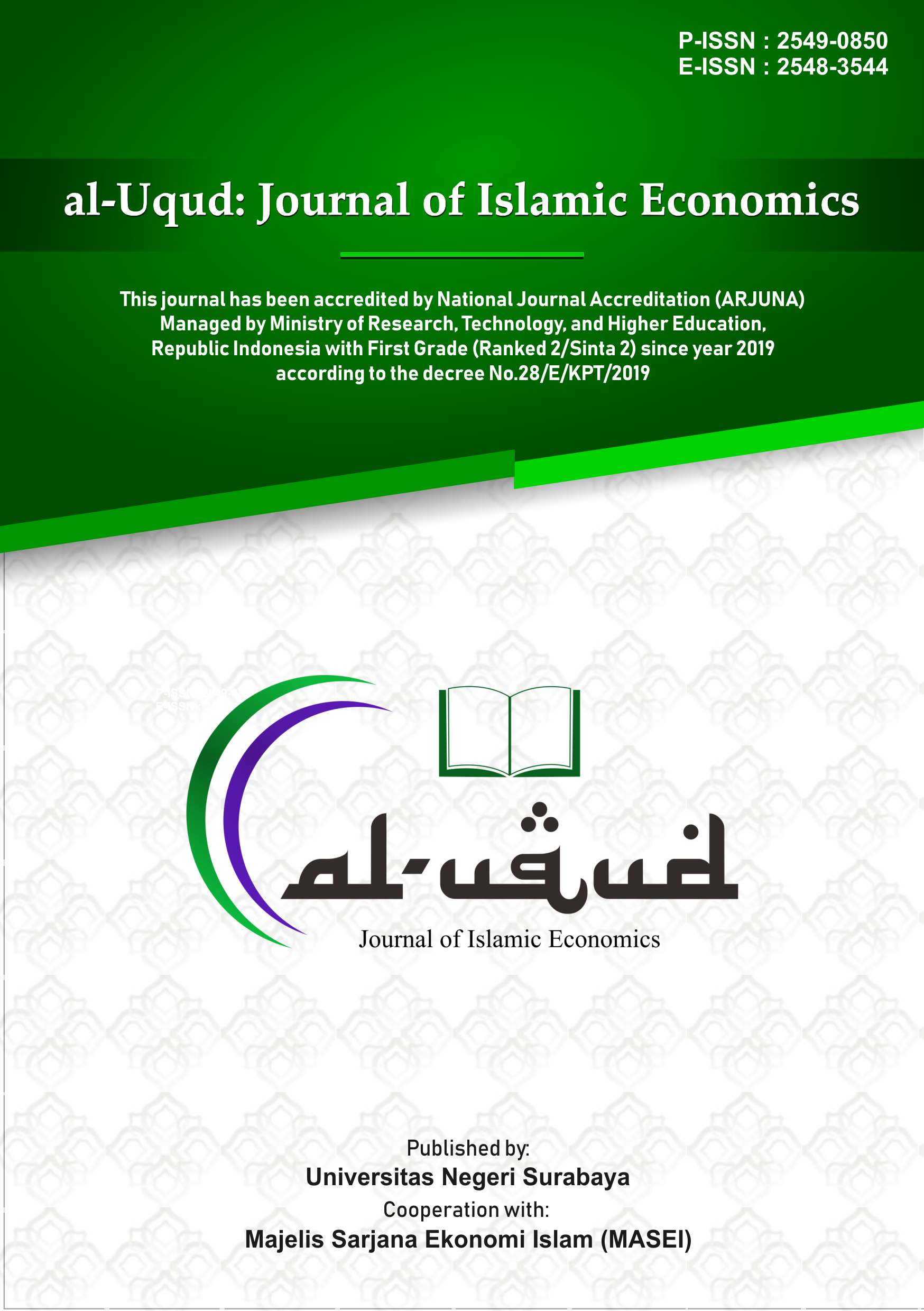The right to choose (Khiyar) innovation for contemporary transaction in e-commerce marketplace
DOI:
https://doi.org/10.26740/aluqud.v6n2.p192-205Keywords:
Buying, Selling, Khiyar, Shopee, Tokopedia, BukalapakAbstract
This study aims to analyze and compare the implementation of khiyar in online transactions at Shopee, Tokopedia, and Bukalapak. This type of research is a comparative study with a qualitative approach in comparing the implementation of khiyar at Shopee, Tokopedia and Bukalapak. This study uses primary data sources and secondary data sources, with data collection techniques in the form interviews and documentation. Data analysis in this study uses data analysis model of Miles, Huberman and Saldana. The results found that There are similarities transaction procedure that applies in the three marketplaces which are two types of khiyar applied, namely khiyar 'aib and khiyar ru'yah. Based on experienced transaction process carried out by sellers at Shopee, Tokopedia and Bukalapak, it was known that there are four sellers who both apply khiyar 'aib, while the application of khiyar aib was only applied by buyer at Tokopedia. On the other hand, khiyar ru'yah was not applied by buyers at Bukalapak but it was only applied by one buyer at Shopee and Tokopedia.
References
Abasimel, N. A. (2022). Islamic Banking and Economics: Concepts and Instruments, Features, Advantages, Differences from Conventional Banks, and Contributions to Economic Growth. Journal of the Knowledge Economy, 1-28. https://doi.org/10.1007/s13132-022-00940-z
Abduroman, D., Putra, H. M., & Nurdin, I. (2020). Tinjauan Fiqih Muamalah Terhadap Jual Beli Online. Ecopreneur: Jurnal Ekonomi Dan Bisnis Islam, 1(2), 35 - 48. https://doi.org/10.47453/ecopreneur.v1i2.131
Adam, P. (2018). Fikih Muamalah Adabiyah. Bandung: PT. Refika Aditama
Amlung, M., Reed, D. D., Morris, V., Aston, E. R., Metrik, J., & MacKillop, J. (2019). Price elasticity of illegal versus legal cannabis: A behavioral economic substitutability analysis. Addiction, 114(1), 112-118. https://doi.org/10.1111/add.14437
Chawki, M. (2022, March). Cybercrime and the Regulation of Cryptocurrencies. In Future of Information and Communication Conference (pp. 694-713). Springer, Cham.
Dalimunthe, N. (2019). Tinjauan Khiyar Terhadap Pertanggungjawaban Penjual Online Terhadap Barang yang Cacat. Jurisprudensi : Jurnal Ilmu Syariah, Perundangan-Undangan dan Ekonomi Islam, 11(1), 74-98. https://doi.org/10.32505/jurisprudensi.v11i1.1111
Demir, A., Maroof, L., Khan, N. U. S., & Ali, B. J. (2020). The role of E-service quality in shaping online meeting platforms: a case study from higher education sector. Journal of Applied Research in Higher Education, 13(5), 1436-1463. https://doi.org/10.1108/JARHE-08-2020-0253
Fitria, T. N. (2017). Bisnis jual beli online (online shop) dalam Hukum Islam dan Hukum Negara. Jurnal Ilmiah Ekonomi Islam, 3(01), 56. http://dx.doi.org/10.29040/jiei.v3i01.99
Gafur, M. A., & Haddade, A. W. (2020). Perlindungan Konsumen Dalam Akad Jual Beli Online Atas Hak Khiyar Perspektif Hukum Islam (Studi Kasus di Kel. Pabiringa Kec. Binamu Kab. Jeneponto). Shautuna: Jurnal Ilmiah Mahasiswa Perbandingan Mazhab dan Hukum, 1(3). 321-366. https://doi.org/10.24252/shautuna.v1i3.14910
Ghazaly, A. R. (2016). Fiqh Muamalat. Jakarta: Kencana
Ghofur, A. (2016). Problematika Perdagangan Online: Telaah terhadap Aspek Khiyar dalam E Commerce. Al-Manahij: Jurnal Kajian Hukum Islam, 10(2), 295-308. https://doi.org/https://doi.org/10.24090/mnh.v10i2.940
Hanafi, F. (2021). Penerapan Konsep Khiyar dalam Perlindungan Hukum bagi Konsumen Transaksi Jual Beli Online. An-nizam, 14(2), 83-102. http://dx.doi.org/10.44633/an-nizam.v14i2.316
Harto, H., & Ambariyani, A. (2018). Jual Beli melalui Internet dalam Persepektif Ekonomi Islam. Khozana, 1(1), 129-167.
Hastig, G. M., & Sodhi, M. S. (2020). Blockchain for supply chain traceability: Business requirements and critical success factors. Production and Operations Management, 29(4), 935-954. https://doi.org/10.1111/poms.13147
Hasan, M. A. (2003). Berbagai macam transaksi dalam Islam (fiqh muamalat). Jakarta: Raja Grafindo Persada.
Huffer, D., Chappell, D., Charlton, N., & Spatola, B. F. (2019). Bones of Contention: The Online Trade in Archaeological, Ethnographic and Anatomical Human Remains on Social Media Platforms. In The Palgrave Handbook on Art Crime (pp. 527-556). Palgrave Macmillan, London.
Implementasi accessed 3 April 2021 pukul 12.36 WIB dari https://kbbi.web.id/
Indra, I. M., & Cahyaningrum, I. (2019). Cara Mudah Memahami Metodologi Penelitian. Sleman: Deepublish
Indriati, D. S. (2016). Penerapan Khiyar Dalam Jual Beli. Jurnal Ilmiah Al-Syir'ah, 2(2), 1-50
Islam, M. M. (2022). Strategic Perspectives of Islamic Entrepreneurship and Marketing. In Strategic Islamic Marketing, 183-202. Springer, Cham.
Jamilah, J., & Firmansyah, F. (2018). Tinjauan Fikih Muamalah Terhadap Penerapan Khiyar Dalam Transaksi E-Commerce. Jurnal Ekonomi dan Perbankan Syariah, 6(1), 49-62. https://doi.org/10.46899/jeps.v6i1.87
Kangean, S., & Rusdi, F. (2020). Analisis Strategi Komunikasi Pemasaran dalam Persaingan E-Commerce di Indonesia. Prologia, 4(2), 280-287. https://doi.org/10.24912/pr.v4i2.6504
Karlina, S., Nobelson, N., & Yuliniar, Y. (2020, November). Analisis Perbandingan Strategi Pemasaran Pada Toko Online (Studi Pada Shopee, Bukalapak, Lazada, Dan Tokopedia). In Prosiding BIEMA (Business Management, Economic, and Accounting National Seminar). 701-713.
Kilay, A. L., Simamora, B. H., & Putra, D. P. (2022). The Influence of E-Payment and E-Commerce Services on Supply Chain Performance: Implications of Open Innovation and Solutions for the Digitalization of Micro, Small, and Medium Enterprises (MSMEs) in Indonesia. Journal of Open Innovation: Technology, Market, and Complexity, 8(3), 119. https://doi.org/10.3390/joitmc8030119
Lousie De Franz (Seller8), Penjual di Tokopedia Interview 3 Juni 2021.
Subhan, ZA. (2017). Hak Pilih (Khiyar) dalam Transaksi Jual Beli di Media Sosial Menurut Perpektif Hukum Islam. Akademika, 11(01), 62-77. https://doi.org/10.30736/adk.v11i01.157
Mardani, D. (2012). Fiqh Ekonomi Syariah: Fiqh Muamalah. Jakarta: Kencana Prenada Media Group
Napitupulu, R. M. (2015). Pandangan Islam terhadap jual beli online. At-Tijaroh: Jurnal Ilmu Manajemen dan Bisnis Islam, 1(2), 139
Nawawi, I. 2016. Fikih Muamalah Klasik dan Kontemporer Hukum Perjanjian. Ekonomi, Bisnis, dan Sosial. Bogor:
Pambekti, G. T. (2018). Tinjauan Hukum Islam Terhadap Pelaksanaan Khiyar pada Jual Beli On-Line di Indonesia. AKSES: Jurnal Ekonomi dan Bisnis, 12(24), 84-98. http://dx.doi.org/10.31942/akses.v12i24.2272
Pujiyanti, S. D., & Wahdi, A. (2020). Transaksi Bisnis Online dalam Perspektif Islam. SERAMBI: Jurnal Ekonomi Manajemen dan Bisnis Islam, 2(2), 91-102. https://doi.org/10.21154/elbarka.v2i1.1662
Widagdo, Prasetyo Budi. (2016). Perkembangan Electronic Commerce (E-Commerce) di Indonesia. researchgate. net, 1-10.
Rahman, S. M., & Muhammad, F. (2021, March). E-Commerce Transactions: A Sharia Economic Perspective. In 2nd Southeast Asian Academic Forum on Sustainable Development (SEA-AFSID 2018) (pp. 384-387). Atlantis Press, 386
Rukin. (2019). Metodologi Penelitian Kualitatif. Sulawesi Selatan: Yayasan Ahmar Cendekia Indonesia
Sahara, S., & Kurniati, P. S. (2019, November). E-Commerce Risk During Transaction Process. In IOP Conference Series: Materials Science and Engineering (Vol. 662, No. 3, p. 032063). IOP Publishing. https://doi.org/10.1088/1757-899X/662/3/032063/meta
Sahroni, O., & Hasanuddin, M. (2016) Fikih Muamalah: Dinamika Teori Akad dan Implementasinya dalam Ekonomi Syariah. Jakarta:
Sakti, M. (2020). Legal Protection for Sellers in the Use of Joint Accounts as One of the Payments in E-Commerce. Journal of Morality and Legal Culture, 1(1), 1-6. https://doi.org/10.20961/jmail.v1i1.44737
Samawi, M. L. (2020). Tinjauan Hukum Islam Mengenai Jual Beli Online. Ad-Deenar: Jurnal Ekonomi dan Bisnis Islam, 4(01), 52-64. http://dx.doi.org/10.30868/ad.v4i01.616
Sarmanu. (2017). Dasar Metodologi Penelitian Kuantitatif, Kualitatif, dan Statistika. Surabaya: Pusat Penerbitan dan Percetakan Universitas Airlangga.
Setiawan, R. A. (2022). Issues in Islamic Derivatives and Proposals for Reforms in the OTC Market in Indonesia. Journal of Risk and Financial Management, 15(5), 222. https://doi.org/10.3390/jrfm15050222
Sugiyono. (2019). Metode penelitian kuantitatif dan kualitatif dan R&D. Bandung: ALFABETA
Suwandy, M. N., & Setyari, N. P. W. (2020). Comparison of The E-Commerce Transaction Value Relationship with Economic Growth in Indonesia and The United States. American Journal of Humanities and Social Sciences Research, 4(3), 1-7.
Syarif Hidayatullah (Seller6), Penjual di Tokopedia, Interview 3 Juni 2021.
Tantimin, T. (2021). Legal Liability of Minors as Perpetrators of Online Buying and Selling Fraud in Indonesia. LAW REFORM, 17(2), 145-156. https://doi.org/10.14710/lr.v17i2.41738
Zahro, A. (2016). Fiqih kontemporer: Buku 1. Menjawab 111 masalah aktual hukum Islam di zaman kita. PT. Qaf Media Kreativa.
Downloads
Published
How to Cite
Issue
Section
License
Copyright (c) 2022 The author(s)

This work is licensed under a Creative Commons Attribution 4.0 International License.
CC BY 4.0 Abstract views: 1153
,
Abstract views: 1153
, PDF Downloads: 1055
PDF Downloads: 1055








